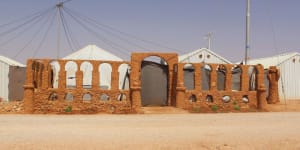Design to Live: Everyday Inventions from a Refugee Camp
Friday, Apr 29, 2022 12:00p -
1:30p
Where:
Online event
Admission:
FREE
Categories:
Art, History, Innovation, Lectures & Conferences, Social Good, University, Virtual
Event website:
https://calendar.mit.edu/event/DesignToLive
Panel discussion with experts :: Part of the Myron Weiner Seminar Series on International Migration
Please register for the virtual Zoom webinar at https://bit.ly/DesignToLive
Panelists:
Azra Akšamija, an artist and architectural historian, is Director and Founder of the MIT Future Heritage Lab (FHL) and Associate Professor in the MIT Department of Architecture and the Program in Art, Culture, and Technology.
Raafat Majzoub, an architect, artist, and writer, is Director of The Khan: The Arab Association for Prototyping Cultural Practices and Editor-in-Chief of the Dongola Architecture Series.
Melina Philippou, an architect and urbanist, is Program Director of the MIT Future Heritage Lab, founder of Trapezui: Marble Objecthoods and Associate at the Department of City Planning, Ministry of Interior in Cyprus.
Moderator:
John Tirman is the executive director and a principal research scientist at MIT's Center for International Studies. Tirman is author, or coauthor and editor, of fourteen books on international affairs, including, most recently, Dream Chasers: Immigration and the American Backlash (MIT Press, 2015) and The Deaths of Others: The Fate of Civilians in America’s Wars (Oxford University Press, 2011).
About the book, Design to Live: Everyday Inventions from a Refugee Camp:
The power of art and design to create a life worth living: designs, inventions, and artworks from the Azraq Refugee Camp in Jordan.
This book shows how refugees use art and design to transform their living environments, restoring humanity within circumstances that seem aimed at depriving them of it. Featuring more than twenty projects created by Syrian refugees at the Azraq Refugee Camp in Jordan, Design to Live offers a new way of understanding design as a subversive worldmaking practice and as tool for reclaiming agency in conditions of forced displacement. The projects—including a vertical garden, an arrangement necessitated by regulations that forbid planting on the ground; a front hall, fashioned to protect privacy; a baby swing, made from recycled school desks; and a chess set, carved from broomsticks—showcase the discrepancy between standardized humanitarian design and the real sociocultural needs of refugees.
This bilingual book in English and Arabic documents designs by refugees through architectural drawings, illustrations, photographs, and texts by the camp residents, humanitarian workers, and researchers who collaborated on the book across cultural and disciplinary borders. Design to Live is the product of a three-year joint project of the MIT Future Heritage Lab and the Syrian refugees at the Azraq Refugee Camp, supported by CARE-Jordan and the German Jordanian University.
Co-sponsors: MIT Center for International Studies
Free and open to the public









